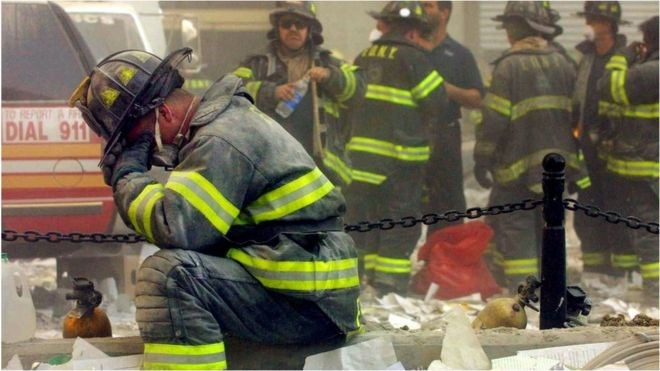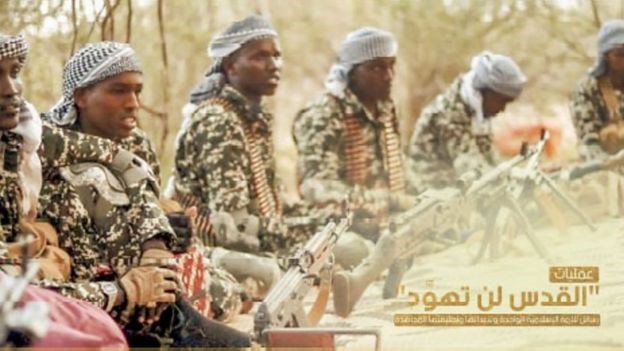
By Mina Al-Lami
Friday September 11, 2020

Al-Qaeda's attacks on US soil were the deadliest in its history.GETTY IMAGES
On the 19th anniversary of the 9/11 attacks in the US, the perpetrator - the then-Afghan based jihadist group al-Qaeda - is in a state of disarray.
Its branch in Syria was silenced in June by a rival force; in Yemen it suffered a defeat at the hands of rebels shortly after losing its leader in a US drone strike; and the leader of its North Africa branch was killed in a French raid in Mali in June and is yet to name a successor.
Meanwhile, al-Qaeda's leader, Ayman al-Zawahiri, has been uncharacteristically absent for months, prompting speculation that he might be dead or incapacitated.
But al-Qaeda's Africa branches, in Somalia and Mali, remain a potent force.Ideologically, al-Qaeda faces a familiar dilemma for the jihadist movement: to modernise and show flexibility in order to win over ordinary Muslims, and basically survive; or stick to strict jihadist principles and risk alienating Muslims.
Each path has its risks.
The first could jeopardise the group's jihadist credentials and lead to splits and defections by hardliners, while the second could significantly limit operational capacity, even to the point of the group's demise.
Recent setbacks
In Syria, al-Qaeda - represented by its unannounced branch Hurras al-Din - has failed to make inroads. This is partly the result of jihadist rivalries on the one hand, and the eagle-eyed surveillance of al-Qaeda officials by the US-led coalition on the other.
The group is also not popular on the ground as Syrians see the al-Qaeda brand as a threat and a magnet for government and international action.
Hurras al-Din has been inactive for over two months now following a crackdown by a more powerful jihadist group and the targeting of some of its top officials in suspected US air strikes.
The group's branch in Yemen - al-Qaeda in the Arabian Peninsula (AQAP) - was once the most feared of all al-Qaeda chapters, but it has suffered a number of blows this year and is currently one of the organisation's least active branches.
AQAP lost its leader in a US drone strike in late January, and recently lost its stronghold in the central Bayda province at the hands of the Houthi rebels.

AQAP's late leader Qasim al-Raymi had warned against spies in a long-running video series.AQAP PROPAGANDA
For years spies appear to have infiltrated the group and facilitated the accurate targeting of its leadership figures.It is also beset by internal divisions.
But one event this year showed that AQAP was still playing the role for which it was previously most feared: orchestrating "lone wolf" attacks in the West.
In February, the group said it was behind the deadly shooting last December at the Pensacola naval base in Florida that was carried out by Saudi military trainee Mohammed Alshamrani - a link the US later confirmed.
Al-Qaeda in the Islamic Maghreb (AQIM), one of the franchise's least active branches, lost its Algerian leader in a French raid in Mali in early June.

Al-Qaeda's North-African branch has maintained close ties with its Mali-focused sister group.AQIM PROPAGANDA
Three months on, the group has yet to name a successor.It is not clear why, but - whatever the reason - a vacant leadership post does not reflect well on the group.
Algeria and North Africa more broadly remain tough for al-Qaeda to make inroads into, given the infamous legacy of jihadists in the 1990s represented by the ultra-extremist Armed Islamic Group (GIA), which was responsible for the deaths of many Algerian civilians.
The Mali-focused Jamaat Nusrat al-Islam wal-Muslimin (JNIM), which also operates in Burkina Faso and occasionally in Niger, was set up in March 2017.
After al-Shabab - an al-Qaeda affiliate in Somalia - JNIM is the second most active al-Qaeda branch.
JNIM attacks are largely focused on local troops and foreign forces, mostly French, in the Sahel.
But in recent months, it appears to have been side-tracked by battles against the Islamic State (IS) group.
In February, JNIM showed readiness to engage in talks with the government of Mali, but with the overthrow of the government in August and the arrival of a new one through a coup, JNIM's fortunes and next steps are unclear.
Focus on Jerusalem
Al-Shabab is undoubtedly al-Qaeda's strongest and largest threat at the moment.
The group holds territory and exercises a form of governance across most rural areas in central and southern Somalia.

Al-Shabab has been waging a brutal insurgency in Somalia for more than a decade.AL-QAEDA PROPAGANDA
In addition, al-Shabab claims daily attacks and frequent high-profile operations inside Somalia and occasionally in neighbouring Kenya.Among its big operations this year is the January attack on the US Manda Bay military base in Kenya, which left three Americans dead and destroyed several planes. More recently, in August, al-Shabab stormed a seaside hotel frequented by government officials in Mogadishu, killing more than a dozen people.
Capitalising on big attacks by al-Shabab and JNIM, al-Qaeda launched in 2019 its global Jerusalem-focused military and propaganda campaign, reiterated in 2020, which cites the "liberation of Palestine" as its purported end goal and situates the US as its ongoing number one enemy.
Message for the US
Al-Qaeda leader Ayman al-Zawahiri has made only one appearance this year, in a video in May.
A month before that, supporters of IS speculated that al-Zawahiri was either dead or had suffered a stroke and become incapacitated. They based this on his failure to appear in new videos or personally comment on key events.

Al-Qaeda leader Al-Zawahiri last appeared in a May video giving a lecture that attempted to refute atheism.AL-QAEDA PROPAGANDA
Several of al-Qaeda's central command officials had already died in the Afghanistan-Pakistan region over the past years or were killed in US drone strikes in Syria.The US-Taliban peace deal signed in February, which stipulates that the militant group will not shelter any global jihadist organisation, could make it trickier for al-Qaeda officials to find a safe haven there.
Al-Qaeda, meanwhile, has attempted to exploit the worldwide health crisis and race protests in the US to win support for its anti-US government message.
The group addressed Western publics in general and those in the US in particular to tell them that their governments had failed to support them during the pandemic and that the "racist" treatment of African Americans in the US could only be reversed through armed struggle.
But it is doubtful that such messaging from a group responsible for the largest terror attack on US soil will resonate with the American public, if it reaches them at all.